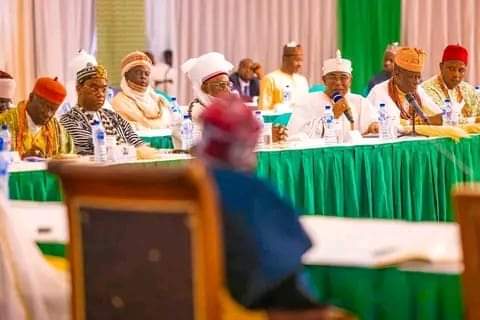By Dr. Ejiro Imuere
Uniqueness and Diversity in Delta State’s Traditional Rulers Council
Delta State, nestled in the heart of Nigeria’s vibrant cultural tapestry, is known for its rich heritage and diverse communities. One distinctive aspect of the state’s traditional rulers council sets it apart from its counterparts in other Nigerian states – the absence of a permanent chairman and the concept of a “first-class king.”

In states like Osun, Edo, Lagos, Sokoto, Kano, Anambra, and others, traditional rulers hold the prestigious position of permanent chairman in their respective states’ Traditional Rulers Council. This position is clearly defined and protected by state laws. For instance, in Osun State, the revered Ooni of Ife assumes the role of permanent chairman, and during transitional periods, the vice chairman acts as the temporary chairman until a new Ooni is installed.
Similarly, the Oba of Benin Kingdom in Edo State, the Oba of Lagos in Lagos State, the Sultan of Sokoto in Sokoto, and the Emir of Kano in Kano State each hold the esteemed position of permanent chairman in their state’s traditional rulers council. The same principle applies to the Obi of Onitsha in Anambra State, among others.
However, Delta State follows a different tradition. According to the Delta State traditional rulers council gazette of 2006, all recognized kings in the state are considered co-equal in status. This means that no king holds a permanent chairman position in the council, and the role of chairman is rotated among the three senatorial districts. Any king, regardless of their domain, has the opportunity to assume the chairman’s position.
Presently, the Orodje of Okpe Kingdom serves as the chairman of the Delta State traditional rulers council. This arrangement reflects the inclusive and egalitarian nature of Delta State’s approach to traditional leadership. It is worth noting that during a recent meeting between President Tinubu and traditional rulers in Nigeria, it was the Orodje of Okpe Kingdom who represented Delta State.
While traditional rulers in states with permanent chairmen can be referred to as “first-class kings” due to their elevated status within the council, the absence of a permanent chairman in Delta State means there is no official classification of “first-class kings” in the state. Instead, all recognized kings enjoy equal status and contribute to the collective governance and development of Delta State.
Delta State stands as a testament to the state’s commitment to diversity, equality, and shared leadership among traditional rulers. The absence of a permanent chairman and the concept of a “first-class king” reflects the state’s belief in fairness and the shared responsibility of its esteemed traditional rulers.
In Delta State, unity and collaboration among traditional rulers are celebrated, enabling the rich cultural heritage of the state to flourish harmoniously.
#DeltaStateTraditions #SharedLeadership #CulturalDiversity #WadoCity
